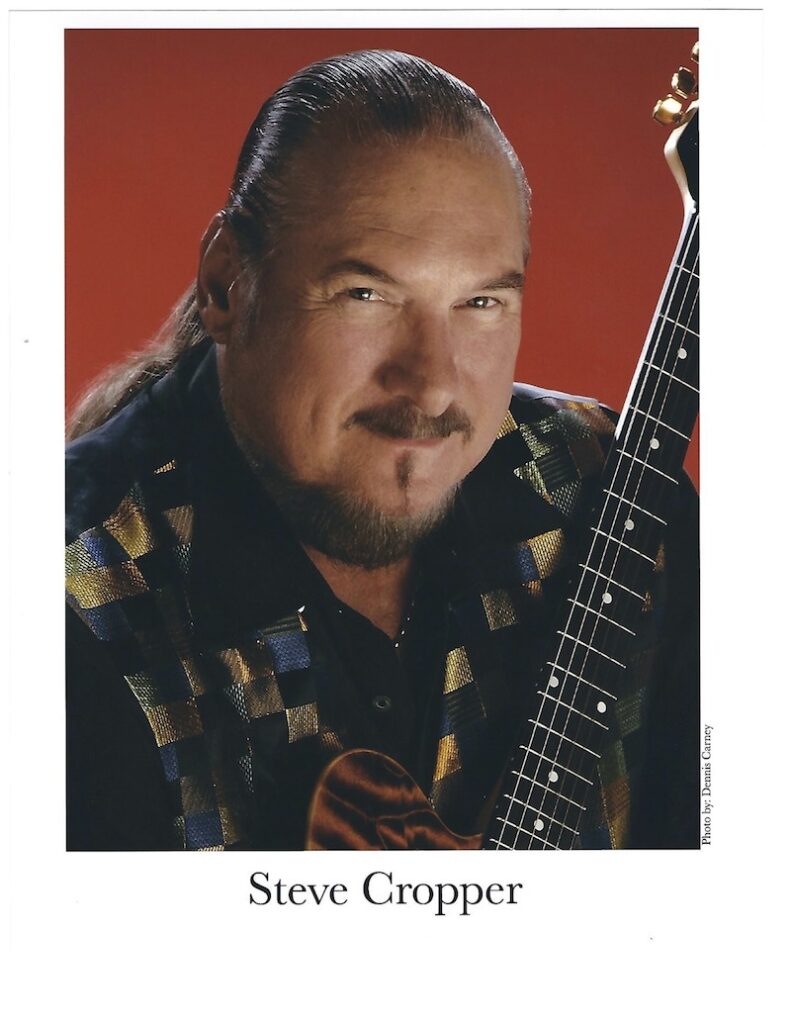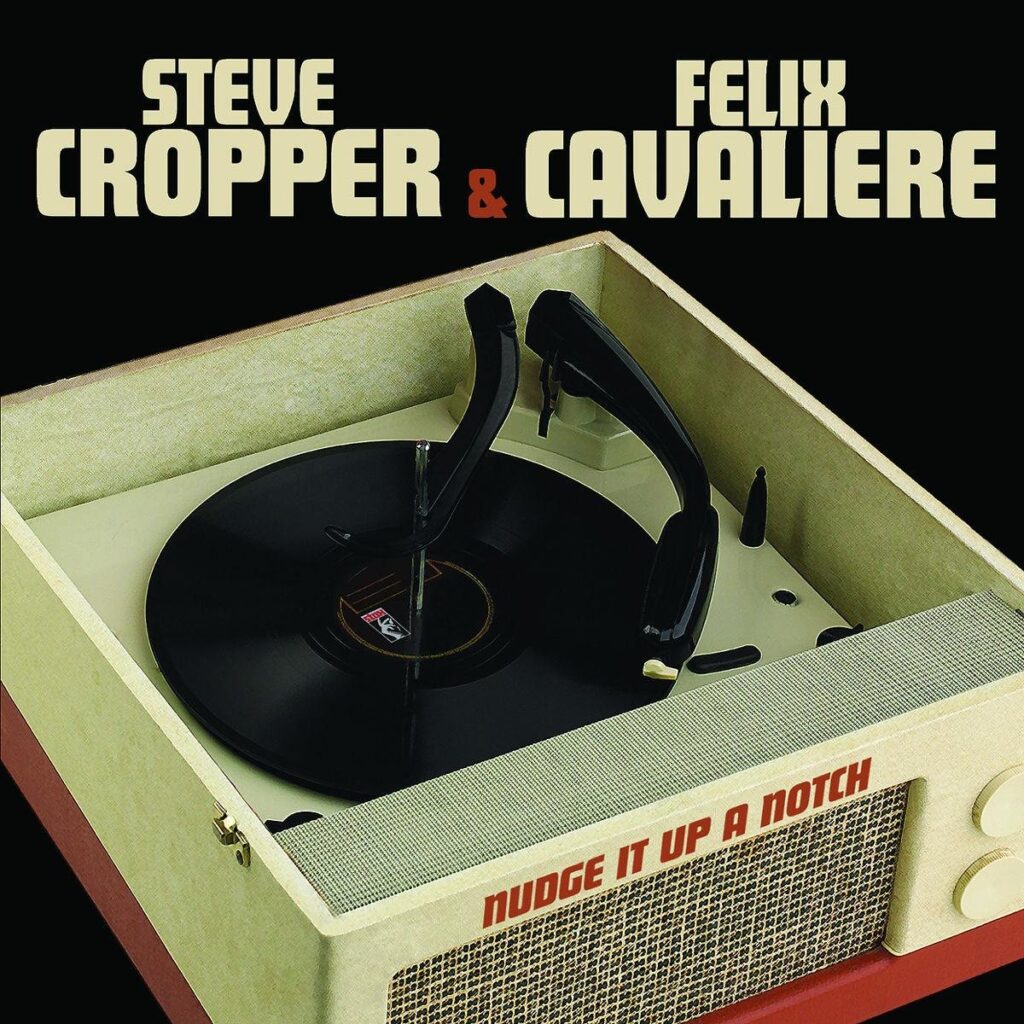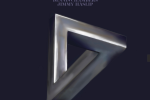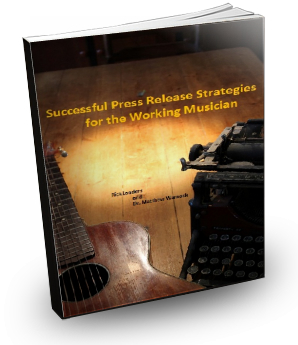Steve Cropper Talks About Booker T. & The MG’s, Stax Records, and Collaborations
Here’s a classic Guitar International from June 23, 2009.
by Brian D. Holland.
 Besides the fact that he’s one of the most important guitarists in pop music history, Steve Cropper’s career milestones extend far beyond that significant achievement. Throughout the prime years of Stax Records, when they were releasing some of the greatest soul and r&b music ever recorded, he was a crucial player, from the perspective of both musician and behind the scenes.
Besides the fact that he’s one of the most important guitarists in pop music history, Steve Cropper’s career milestones extend far beyond that significant achievement. Throughout the prime years of Stax Records, when they were releasing some of the greatest soul and r&b music ever recorded, he was a crucial player, from the perspective of both musician and behind the scenes.
Essentially, it began in 1962 with the release of “Green Onions,” by Booker T. & the MGs, the song viewed by many to be one of the greatest instrumental pop hits ever recorded. Though the funky and rhythmic framework was what the buzz was all about, the extraordinary talent of each member of the band had much to do with the recording’s success.
For fans of early rock ‘n’ roll, R&B, and funk, it was the first time ears were exposed to the amazing little riffs and funky chops that exuded from Cropper’s blonde Telecaster. It was a trait that grew and solidified in vocal music as well, when his talent for filling in the holes and playing between the verse lines was realized. The fact that his name is displayed alongside many of the greatest r&b hits in history, in both the writer and co-writer capacity, more than substantiates his vital presence in the music of the era.
Cropper’s catchy signature riffs and rhythmic chops in Otis Redding’s “(Sittin’ On) The Dock of the Bay,” and “I’ve Been Loving You Too Long,” Wilson Pickett’s “In The Midnight Hour,” Eddie Floyd’s “Knock On Wood,” and Sam & Dave’s “Soul Man,” to name a few, are just as memorable as the music’s vocals and melodies.
With a style that prompted recognition by music business heavyweights, such as Albert King, Aretha Franklin, Rod Stewart, John Lennon, Ringo Starr, Poco, Levon Helm, and Neil Sedaka, his status as a studio musician soared. In fact, Cropper’s studio session credits grew to be so prolific that even he has no idea of the actual count. Soon enough, everyone wanted that funky Telecaster rhythm and those cool licks in their songs.
“The Colonel,” as he’s also known, is at home on the other side of the studio glass as well. His songwriter, producer, and A&R manager credits go almost as far back as his status as a professional musician. While a member of Booker T. & the MGs, the Stax house band in the early ’60s, he had collaborated with Jim Stewart, David Porter, and Isaac Hayes in composing and producing many of the great Stax soul and r&b hits and their respective albums. He went on to produce a series of highly acclaimed projects over the next few decades, as his flair for managing the musical product continued to expand and develop. Them Changes, by Buddy Miles, the Jeff Beck Group album, Two Sides of Moon, by Keith Moon, and Inside Story, by Robben Ford, all made in the ’70s, are just a few examples of the many projects Steve Cropper was associated with as a producer. His production credits continue to mount to this day.
In 1978, when comics John Belushi and Dan Aykroyd put together The Blues Brothers, the eminently successful r&b cover band that began as a mere time filler for the Saturday Night Live television show, the essential chops of Steve Cropper and Donald “Duck” Dunn (bassist for Booker T. & the MGs) were sought. Cropper’s and Dunn’s contributions resulted in a sound that was both exciting and genuine. Television viewers were fascinated by the quality of the The Blues Brothers music. Though an ordinary comedy sketch was anticipated, they were exposed instead to captivating performances that were hilarious and exhilarating. The Blues Brothers, of which Cropper is still a touring member today, went on to make two movies and a few successful record albums.
Today, Steve “The Colonel” Cropper sustains a busy career in all aspects of music production and musicianship, and throughout all of the touring and studio work he still manages to find time for his own projects.
His 2008 CD release, Nudge It Up A Notch, is a collaboration with Felix Cavaliere, the legendary lead singer and keyboardist of the Rascals. The album is a soul and r&b tour-de-force, drenched with wonderful melodies and funky instrumentals. It’s much like a collection of new songs by the Rascals and Booker T. & the MGs, enriched with those Telecaster Cropper riffs, amid Hammond B-3 timbre and soulful vocals. It’s pushed along by the rhythm section of bassist Sammy “Shake” Anderson and drummer Chester Thompson, and was produced with help from Jon Tiven [Delbert McClinton, Graham Parker, B.B. King, and more].
During my recent conversation with Steve, I found him extremely gracious and easy going, traits that one can readily perceive as strong attributes or sensibilities that have helped strengthen and nurture a career that’s characterized by an abundance of collaborative work with an A-list of world class performers.
Brian: Well, it’s a matter of opinion, but … [Both laughing]
Steve: We have a difference of opinion, Brian, but that’s okay. [Still laughing] But, the more they talk about it, the harder it is to live up to. It’s a lot of work.
Brian: I suppose it can be. But, you’ve done it all.
Steve: Pretty much. And I’ll stand behind the records. I don’t have to go out and be part of the battle of the bands anymore, so that’s pretty good.
Brian: You’ve been involved in so many [records] over the years, recordings that are still quite popular.
Steve: It’s amazing how the music lives on, but it’s unfortunate that there’s nationally a lack of air play, as well as a lack of interest in that kind of music. It definitely has its audience, and that audience is true to form, and they stay with it. I just got back from a tour of England. I went over there and played with the Animals for about two and a half weeks and had an absolute blast. But, there were a lot of gray haired people in that audience. It was real interesting. [Laughing]
Brian: I read that you also played in Ireland for the first time.
Steve: Yeah! We played Belfast. It was the first time I’d ever been up there. I had done some TV in Dublin, but it was the first time to actually do a concert. It was great, and the people were so warm and so nice. I did some radio shows for the BBC and some local radio stations. It was super, a real lot of fun.
Brian: Tell me about your early influences, Steve, those who coerced you in your R&B direction.
Steve Well, in the time I came up it was pretty obvious, the top of the crop in a way. People like Bo Diddley and Chuck Berry. But, my main influence who I wanted to emulate, even when I was a kid, other than some of the great jazz players, was Chet Atkins. He is one of the all-time great guitar players to have ever lived. I’ve loved his music, but I found at an early age that I probably wasn’t going to be good enough to play like that. Then, I think I got smart enough to say, “Well, the world doesn’t really need another Chet Atkins.” [Laughing] You know? But I was really influenced by Bo Diddley’s rhythm, and by Lowman Pauling of the “5” Royales. He was the leader of the band. He was also the lead guitar player and wrote a lot of the songs.
They created a lot of stuff that later got covered, stuff that other people sort of got lifelong credit for. Those guys really started it. They were a little like Hank Ballard and the Midnighters. But, the licks, when you hear Lowman Pauling, there was a song called “Think,” that kind of told me that it’s fun to play in the holes, because you’ll stand out. If you’re just playing back there with a singer singing over you nobody’s going to hear you.

Brian: You learned that well. Didn’t you?
Steve: I suppose I did. So, it was just an early style and it seemed to work. Chips Moman [Stax Producer, American Records founder] gave me a tip when I first started doing sessions. I said, “Chips, somebody wants me to do a session.” He said, “Hey, just go on in there and listen to what they tell you. Listen to the song and just play what you feel. They’ll tell you if they don’t like it.” So, that’s what I did, and I started getting the call to do lots of sessions, until I started working permanently for Stax.
Brian: When I first heard “Dock Of The Bay” years ago, the Otis Redding vocal stood out over everything else. However, after a while those lead guitar fills were just as prominent. Your fills stick out in all of those songs.
Steve: Well, you can’t do it all the time, but you try to. I tried to weave in and out of the vocal. I’d pick up where the vocal leaves off and do something that’s more lyrical than musical, that sort of follows the melody and gives the mood of the song. That’s what I’ve always tried to do. Probably one of the most difficult things I ever had to do was when they really got into multi-tracking and overdubbing. They’d call a session, and they’d find the key over the phone of the singer and just cut tracks. That’s hard for me to do. I’d rather be hearing that singer, so I can bounce off the singer and get a feel of what he’s doing, or what she’s doing. That’s what I’m good at. It’s very difficult for me to cut tracks without a singer. They become instrumentals at that point.
I think the Stax stuff we did lived so long because it was all performances. Most of the hits you know were done in one take. There were really no overdubs. There might have been a little mixing later, back when we finally got a 4-track, but there weren’t any real overdubs. In fact, if there were, then in was a tambourine, or some hand clapping. Maybe some backgrounds, like the kids on “Soul Finger.” David Porter [Stax Records producer and songwriter] got about 25 or 30 high school kids in the studio. We got them to go “Soul Finger!” [Laughing] It was real exciting. But that was an overdub. There was none of this start with a drum track and then overdub everything else.
Brian: On your new album with Felix Cavaliere, Nudge It Up A Notch, a sound quality exists on the whole thing, and not in just the R&B stuff. Your playing alongside Cavaliere is great, totally amazing. But, simultaneously, within the rhythm section of Shake Anderson [bass] and Chester Thompson [drums], you can perceive a crispness to everything.You don’t always hear bass guitar that prevalent in music these days.
Steve: Yeah! It’s either so busy or so buried, or so low that you just can’t get it. It becomes just bottom without real playing. But, he’s right there with Chester. The kick drum and the bass are just so tight. That’s what we always strived for in the studio in the old days. But, on that I had to overdub. And with all due respect to everybody I’ve ever played with, I’ve always made the comment that when it’s my turn to play, I wish the other guitar player would play behind me as well as I played behind him when it was his turn. They sometimes seem to say, “Okay, it’s Cropper’s turn, so I’ll just play back here and not do anything until he’s through.” I do stuff that complements what a guy’s doing.
I want him to be as good as he’s ever going to be at that moment, so I’ll try to set up a rhythm that’ll kick him in the butt. So, it was fun for me to lay down the rhythm tracks because I knew where I’d be soloing. Not the fills, but the solo parts. I’d lay myself down a good rhythm so I could listen to it. That’s where I get my inspiration. In the old days with Booker T., I got my inspiration from Al Jackson.
One time I got a letter from someone who was writing about drummers and such. He said that someone told him that Stax was the first studio to use a drum machine. I wrote back saying, “That’s true. His name was Al Jackson.” [Both Laughing] I don’t know about the electronic part or not, the first time I saw one of those. But, I think it was in L.A., years later.
Brian: What was the atmosphere like in the studio with Felix Cavaliere and the other guys?
Steve: It was great. It was a bunch of guys there for the same purpose. And that was really to have fun. That’s what it was really all about. We started that way, never knowing we’d do it more than the first time. We’d just show up and have some more fun, and come up with another one. In the meantime, Tiven would email me, and we’d be writing lyrics back and forth.
He’d say, “Can you make it next week?” I’d say, “Yeah, okay.” We started building, and finally, Jon Tiven said, “Man, you guys should start thinking seriously about doing a whole album of this stuff, rather than just writing songs to send to somebody just to see if they want to cut it.” But, I never thought it would go any further than out on the Internet, maybe to download. I didn’t know it would wind up on a record label, so that’s pretty cool.
Brian: It’s kind of like an album of Rascals and Booker T. & the MGs songs.
Steve: It is. Felix and I have been playing together for a while. It started with the Ringo Starr Band. When Randy Bachman left he wanted me to come and join them. We talked about it, and then I did. I think we did about 21 shows together. That’s when Billy Preston was in the band. We still had Mark Farner, and they brought in Lou Gramm. That was a pretty good combination. We did a lot of corporate shows. I called it “Jukebox Onstage,” because everybody was just doing their hits. That’s what people want to hear, you know.
Brian: He [Ringo] has done a pretty good job at putting those tours together.
Steve: Yeah. It was a smart idea.
Brian: And he has shown so much respect for everybody’s music.
Steve: Exactly. That was really the initial idea with the Blues Brothers. John and Danny never thought it would go any further than just a few shows.
Brian: Wasn’t it just a skit for Saturday Night Live, originally?
Steve: Originally, yeah. To tell you how what happened, they used to go out and warm up the crowd before the show would start. They’d go out and do a couple of numbers and everybody thought it was really great. But, Lorne Michaels would never let them do it on the air. One night one of the skits didn’t get finished, so they had this hole in the show at the last minute. He said, “Well, we’ve got to do something. Go out there and do that Blues Brothers thing.” Well, it was an overnight success. It may have happened accidentally, but it was a good accident.
Brian: But, with the caliber of musicians in the band, along with the Belushi and Aykroyd stage show, you guys must have known how good it was.
Steve: Well, I think they did. It was John and Danny saying they wanted the best, and to get these guys because they’re good at this. They searched us out pretty well, and Duck (Donald ‘Duck” Dunn) and I had been in the Saturday Night Live Horns and had done two albums and two tours with Levon Helm and the RCO All Star Band.
When they were putting the band together, John went to Tom Malone and said, “Do we want to use all the guys from the show, or do we want to mix it up?” He said “You need to get Dunn and Cropper. Man, those guys are old road dogs. Call them.” So, he did. Duck and I decided to do it. We did about seven shows at first, opening for Steve Martin at the Amphitheater, which they recorded. They called and said, “That stuff is pretty good. I think we’ll try to put an album out.” The thing went triple platinum!
Brian: The movie itself is a cult favorite.
Steve: Around the world, we have fans who’ve seen the movie over six hundred times.
Brian: How were lead singers Aykroyd and Belushi as characters to work with? Were they fun?
Steve: It was a lot of fun. It was crazy. But, the thing is, they didn’t play with the music. They had so much respect for it, and they were serious about it. We got a lot of initial review flack about it, that John and Danny were mocking rhythm and blues. And that wasn’t true at all. He was seriously playing his harmonica and John was seriously singing. He had been in bands for years, playing drums and singing. And Belushi had one of the biggest blues collections I’d ever seen. It was amazing, thousands of blues records. On one of the albums he says, “I suggest you go out and buy as many blues albums as you can.” I’ll never forget that. It was great when he said that. He was a promoter of the music. He wasn’t making fun of it at all.
Brian: They were so good at it.
Steve: Oh, yeah, the entertainment part of it, the talent, and of course, the flips and the silly dancing. But, when you listen to it, the music is really serious.
Brian: You’re still playing with the latest concoction of the Blues Brothers. Is that right?
Steve: We still work all the time, not record wise. But, we’re in our twentieth year and we just finished a world tour. We’ve been all over. Right now, on vocals we have Johnny Rush, and Eddie Floyd has been with us for about nineteen years, the original “Knock On Wood,” Eddie Floyd. So, we start off with a Blues Brothers show, and we do songs from the movies and whatever, and then we bring Eddie out and do a Stax vocal review. We finale it with the two guys, and we’ll do songs like “Soul Man,” and “Everybody Needs Somebody.” It’s a good ninety minute show, a lot of fun.
Brian: Booker T. Jones has been known to say that you can get many different sounds out of a Telecaster without even changing the guitar’s settings. Besides the idea that tone is in the fingers, what else has been essential in your conquest for different tones?
Steve: Well, I do a technique that a lot of guitar players do. We play with a pick when we need to and we play with our fingers when we need to. Technique wise, it creates a totally different sound. I don’t change the amp settings; they stay right there. I don’t use foot switches. With Booker T. there were a couple of songs, like “Groovin’,” and “Summertime,” that required tremolo.
So, I have a little floor tremolo, because I use a Fender Twin that doesn’t have a vibrato in it. The old ones did, the old Super Reverbs and Twins. That’s the only foot switch I use, and I don’t even use it with the Blues Brothers, just with Booker T. The sounds just come from the technique. I don’t even change pickups. On my Fender Telecasters, I play on the middle position, so I’m activating both pickups. And then the Peavey, the prototype I play all the time, I’ve got it on the neck pickup all the time, because it’s a little thicker.
Brian: Which do you play more often, the Fender [Telecaster] or the [Peavey] Cropper Classic?
Steve: I play the Cropper Classic, but it’s a prototype without Cropper Classic written on it. But, it is my settings, pickups, and all that sort of stuff. I have two that I play. Both are prototypes. One of them I’ve been playing almost fourteen years. They’re both Telecaster shaped, but one of them is grooved in the back like a Telecaster Deluxe, so there’s room for your belly. [Laughing] It’s sort of contoured like a Strat, but it’s still a Telecaster.
Brian: With Otis Redding, Sam & Dave, and Wilson Pickett, was it an identical mindset for you with each performer, or did any one of them require a vast change in playing style?
Steve: I’d definitely say that the stuff I did with Otis was a distinctive tone and style that I didn’t play with anyone else, that I know of. I didn’t really bring that back out again until I worked with Tommy Dowd, with the Rod Stewart album, Atlantic Crossing. I brought out my old amp and one of my old Teles and we used that old sound, and it worked out pretty good. But, yeah, when Otis went away I just kind of retired that sound.
I was tuned to an open chord; most of Otis was an open E chord. I did a few things tuned in D. But, most of them were in E. It was less musically correct because there were no minors in Otis’ music, mainly because of the open tuning, even though I learned how to make minors with it. I could hear a different tone in myself, and I played a different style of licks, I think.
Brian: Was Otis as passionate in the studio as he was onstage?
Steve: Well, he was one of the greatest guys you’d ever meet in your life. He was everybody’s big brother. He was my brother, and he was so streetwise. I never looked at him and me as being the same age. I never even thought about it, and I never asked him his age. But, we were both 26 when he died.
Brian: You’ve worked with everybody it seems. The word intimidation mustn’t be in your vocabulary at all. [Laughing]
Steve: That’s too funny. When I look back on it, I can’t believe how many people I’ve worked with. Somebody asked me the other day if I had any idea how many sessions I’ve played on, how many songs and whatnot. I said I didn’t have a clue. Thousands. [Laughing]
Brian: You’ve worked with other great guitar players, too, like Albert King.
Steve: I had a lot of fun doing that. Albert King, and later Jose Feliciano and Jeff Beck. Just on and on.
Brian: You produced the Jeff Beck Group album.
Steve: Yeah, I did! I’m surprised you know that.
Brian: You produced one of Robben Ford’s albums as well [The Inside Story – 1979].
Steve: Yes. He’s a great player.
Brian: You were 21 years old when Booker T. & the MGs recorded “Green Onions.” Did you and the band realize, when it was being recorded, what a success the song was going to be, or was it just another instrumental at the time?
Steve: I knew “Green Onions” was a hit immediately. I knew it when I heard it. I believed in it so much that I called Scotty Moore [Elvis Presley guitarist] and said, “I think we cut a hit yesterday.” I then asked if he had time to cut me a dub on it. He said, “Yeah. Bring it on over.” So we did, and he said, “Man, that’s pretty good; it’s catchy. What do you call it?” I said we didn’t name it yet. I went down to see a disc jockey friend of mine, who was on WLOK [Memphis radio], named Reuben Washington. I told him that I think we cut a hit over the weekend, and that I wanted him to hear it and tell me what he thinks.
He put it on the turntable while he was playing another record on the air. He put the speakers on in the control room. He listened to the intro and about half of the first verse, and then backed it up without even saying anything. When the other record was through he turned it on and spun it. He played it four times, and said, “Cropper, that’s the funkiest thing I’ve ever heard!” The phones lit up with people calling and asking who it was. It was funny. He said, “We don’t know. We don’t have a group. We don’t have a name for the song.”
When I got back to the studio the phones were lit up there, too, with people asking about this song they just heard on the radio. They wanted to know where they could buy it. We called the guys and had a meeting that afternoon. We wanted to put the record out, but needed a name for the group and the song. Lewie Steinberg, who played bass on “Green Onions,” said, “Guys, let’s call it “Onions. Onions are the stinkinest thing out there, and this is the stinkinest music I’ve ever heard.” [Laughing] He said it like ‘stank’ instead of ‘stink’. I said, “I agree, but it’s a little negative. Isn’t it? Onions?” I said, “What about “Green Onions”? Everybody likes a little green onions with their Sunday dinner and all that. So, it was “Green Onions.” There you go. I think Al Jackson Jr. came up with the name for the flip side, “Behave Yourself.”
Brian: There have been a lot of good instrumentals recorded over the years, like the songs by the Ventures. But, I think “Green Onions,” is certainly one of the best.
Steve: Just an inner feeling, coming from your soul, I knew that was a hit. There were some others that I thought were hits that weren’t. I definitely knew that “Dock of the Bay” was a hit. Otis and I looked at each other and said, “Man, we finally got it.”
We were looking for something that would cross over, meaning from the R&B stations to the pop stations. If the pop stations would start playing it we’d sell more records, and that’s what we were looking for to get his career going. He was real big in Europe. He was fairly big here, but he hadn’t reached it yet. We knew that was the song, but it was too bad that he wasn’t around for it.
Brian: But, it was amazing how much those little licks had to do with it.
Steve: Yes. Isaac [Hayes] came to me in the studio, where I was logging some tapes and editing, and said, “Dave [Porter] and I wrote a hit this afternoon. We’re gonna cut it tomorrow with Sam and Dave, but I don’t have an intro for it.” That was “Soul Man.” He knew that they wrote a hit. So, we sat down, and I got my guitar out and said, “Alright, play me some changes.” I started playing these licks against the changes he was doing, and he said, “That’s it! That’s it. That’s what we’re gonna use tomorrow.” That’s what we did.
We had a lot of fun writing intros. A lot of the intros had almost nothing to do with the song itself. It was an attention getter. You remember the days when the DJs always talked until the singer started singing. They’d be rapping about their show or trying to sell a product or something. I intentionally started doing intros that you could almost not talk over. They were loud and forceful and all that. We toned down when the vocal came in. The gangbuster intros were very deliberate back in those days.
Brian: Talk about the Peavey Cropper Classic.
Steve: Let me tell you what happened with that. They had been after me for a while, and the reason was that a real good buddy of ours down in Memphis, he and Duck [Donald “Duck” Dunn] lived on the same golf course and played golf a lot, was the regional salesman for Peavey. Peavey of course being down in Meridian, Mississippi. He tried to get Duck involved in playing their bass. He played some of them, but stuck to his Fender. I think they finally got Carl Perkins to sign on and made the Carl Perkins guitar. I went to some record store down here and picked one up, but it wasn’t my style. It was too close to a Strat kind of thing, and I was a Tele guy.
One day he called, wondering where I was going to be. I told him I’d be working at Omni Studio. He came in with a guitar, and during the break I went over and checked it out. I looked at it and said it was nice. I then picked it up, and after noticing that it was a little heavy, I plugged it in and went, “Whoa! That sounds pretty good.” I asked one of the session guys to come over and play it and tell me if he thinks it’s as good as I think it is.
He played it and said, “This is some guitar. This is great.” He then said, “Can I have one of those?” I said, “Well, you can’t have that one.” [Laughing] Anyway, I took it home and stuck it in my guitar room and it stayed there for a while. I got asked to go out on the road with Dave Edmonds. I knew it would require a lot of playing. Graham Parker was there too. So, I got all my amps out. I set them up in a room. I then got out all my guitars and started plugging them in and using different combinations. When I got to [the Peavey] I said, “Whoa! I forgot about this guitar.” And man, it just sounded good. I started comparing it to my Teles and all, and with all due respect to Fender, it just ate all my Telecasters. The pickups were hotter and the sound was thicker. So, that’s what I went out with. And I played it for a long time. A guy named Jim DeLuca made that guitar, the Signature Series prototype.
Brian: And you still play the Fenders too?
Steve: I do sometimes, absolutely. I have several. I’ve got some really good Telecasters that I just love. I play them more in the studio, when I need that sound. But, onstage, these guitars allow me to kind of duplicate some of the sounds from the records, which is hard to do. It’s hard to duplicate the sound onstage that you can get in the studio with the right mic, the right setup, and the right engineer.
Brian: How about the amps used, in the studio and on the road?
Steve: Well, it varies in the studio. We have an amp that was handmade in Chicago. It’s like a tweed Twin. It’s called a Victoria.
Brian: Victoria makes nice amps.
Steve: It’s very good. Handpicked tubes and everything. On the road I use a red-knob “The Twin.” I think it’s some of the Sunn technology. I have some very special amps that Peavey made me. I have a 5150, which is a Eddie Van Halen. But, it’s been specially wired so it’s not the same matrix as what goes out into the street. It’s a real good one. It’s a little hard to carry around, because it sits on a big bass cabinet with four fifteen inch speakers in it. So, it’s great for big outside concerts. We’re able to rent the Fender “The Twin” in most cases. If they can’t get it, I’ll opt for one that’s got a little more wattage. I like the hundred watt Twin.
Every now and then I’ll pull out my old Fender Harvard that I used on “Green Onions,” “Loving You Too Long,” and “(Sitting On) The Dock of the Bay.” It has two inputs, a tone and a volume control, and that’s it. Lately I’ve been using these Gibson laminated strings, over the past two and a half years.
The reason I use them is that I can play three shows guaranteed without changing strings or breaking one. When I used some of the other brand names I was good for two shows. If I stretch into a third show, invariably I’ll break one. I don’t know why that is, but I think it’s because they’re not laminated. A lot of guys don’t like the lamination because they feel they’re too dead for them. I’m an old school guy. In the studio at Stax I didn’t change a string until I broke one. So, when I put on the new one, obviously it was brighter than the old string. I used to take a Chap Stick and run it up and down the string. It would fill in the winds and deaden the string and make it sound like the old string.
Brian: No one can say that there was anything wrong with Steve Cropper’s guitar sound on those old songs. Obviously, it worked.
Steve: I appreciate that, man.
Brian: Congratulations on the new album with Felix Cavaliere, Nudge It Up A Notch. The melodies are fantastic.
Steve: By the way, I think you wrote an article I read, a review of the Nudge It Up record.
Brian: I did, yeah, for my column in Modern Guitars magazine!
Steve: I’d like to thank you for that. That was a good one, and you said some nice things about “Make the Time Go Faster.” I said, “You know, he gets it.” We’re not trying to go into competition with hip hop; it was just a fun thing to do.
I read a lot of reviews, and they said “It’s all good, except for …” I said, “You know what, the next time they have a barbeque in their back yard, I wish they’d put on our record and then watch the heads start moving when that song comes on.” But, thanks, man. It’s doing well, supposedly a top download. So, it’s causing a little noise. I saw [producer] John Burke at the R&B awards and they’re all very excited about the record. You just don’t get that anymore. If you don’t sell a million within the first two weeks it’s off to the next one. But, these guys are really into this record. They really like it.
Related Links
Play It Steve
Stax Records/Cropper
Modern Guitars Review: “Nudge It Up a Notch” by Brian D. Holland








